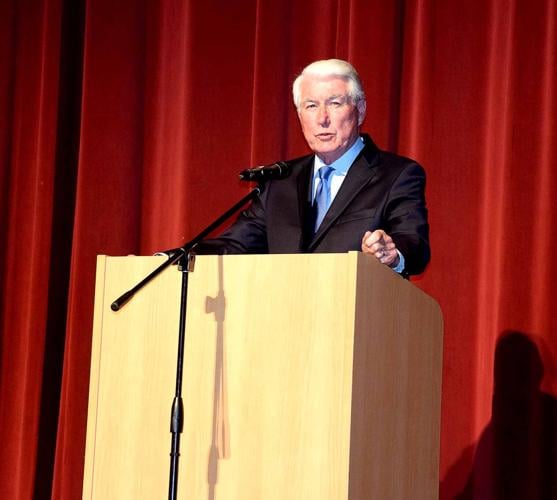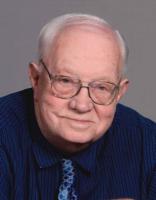Former Gov. Jim Edgar spoke about his successes, his failures and his hopes for the future of Illinois and the United States during a speech and discussion this week at the Effingham Performance Center.
The visit from the two-term Republican governor, who served from 1991-99, was put together by the Effingham Public Library with the goal of giving people in the community a chance to better communicate and find common ground with each other. Amanda McKay, the library’s director, said that Edgar was the best person that they could think of to provide that message.
“Patrons will come in and share with us that our current method of communicating makes it harder for people to connect,” McKay said. “There’s a lot of factors at play between trying to find common ground with each other. We would have patrons come in and share that with us. ‘I feel like I’m losing friends because of things that are posted on social media,’ or ‘It’s harder to talk to people about challenging issues.’
“We took a moment and tried to see if there was anything that we could do.”
What they came up with was inviting Edgar to Effingham, a place that he noted had a special place in his heart for one reason: Just after his marriage to his wife, Brenda, he spent the first night of their honeymoon in a hotel room in Effingham.
“We were out at the Ramada Inn, which to us was uptown, that was living,” Edgar said. “It was a pretty exciting night; we spent one night in Effingham, then drove to Springfield, spent a night and went to see Lincoln’s Home. I think she began to wonder what kind of person she married.”
From that first night in Effingham, Edgar went on to a long and storied political run that went through the General Assembly to the Secretary of State’s office and all the way up to the governorship. He explained his philosophy for working with politicians who may not agree with him on important issues, dividing it into three important factors: compromise, civility and compassion.
Edgar believes that in order for government to work properly, people must compromise on issues. While he had to make deals and find common ground with Democrats for most of his tenure — as Democrats controlled at least one house of the General Assembly for six of the eight years he served — he also found himself making deals with his fellow Republicans, as they spanned all corners of the state and came from different, divergent areas.
“To be able to get something done, you’re probably going to have to find some common ground with the people you’re working with,” Edgar said. “(That’s) even if you are Governor and you have your party controlling the legislature — which I did for two years out of my eight. Let me tell you, that was just as difficult as when my party wasn’t controlling the legislature.”
However, he also feels that compromise can’t come if people aren’t civil. Edgar believes that the kind of mud-slinging politics so common in today’s fast-paced, social media-driven climate does not provide the backdrop for anything to get done in the legislative realm.
“If you’re a person who’s always yelling, always denouncing the other person and saying that they’re not very smart or implying they’re a crook, you’re not going to have much luck when it comes time to try to find common ground with that person and get them to go along with something that you want to do,” Edgar said. “Unfortunately, in our society today, there’s an awful lot of shouting and name-calling, and there’s not as much listening as what needs to go on.”
Finding common ground and having civility can help with showing compassion for people, he said. Edgar believes that government should provide help for people who can’t afford to get help themselves and warned that if governments don’t show compassion, people can lose their lives because of it.
“Government has to have compassion for those who are in real need,” Edgar said. “We get in fights in Springfield and Washington and there’s talk that the federal government may not have (the) ability to pay bills. Who does that hurt? It doesn’t really hurt those at the top; it hurts those at the bottom.”
Edgar explained how an effective government can work for the people through a story that he told about a ribbon-cutting he did in Chicago during the midst of the 1994 gubernatorial election. While heading back to his car to return to his office, he was greeted by a man who said that he had taken away his welfare check during budget negotiations in his first year in office. What happened next took the then-Governor by surprise.
“Before I could say anything, he said, ‘You took away my welfare check and that was the best thing you could have done (for me),’” Edgar said. “We (the legislature and the Governor) said, ‘You can keep your (welfare) check for six months if you go into a job training program.’ That was the compromise and that gave me a chance to cut some expenditures. He said, ‘I wanted to keep that check, so I went to the job training. I got a job (and) I can’t tell you how proud I feel when I come home at night and my little girl knows I’ve been to work.’”
A speech about his philosophy and about how government should work for the people led to a discussion section, with questions asked by students in Jim Hammer’s social studies classes at Effingham High School. Many of those questions revolved around how Edgar would respond to various issues of modern politics, from COVID-19 to the economy. He also advised those young people looking to get their foot in the door in the political field to get involved however they can.
“We’ve got a lot of very bright young people,” Edgar said. “I’ve spent 15 years lecturing at the University of Illinois campuses around the state (and) kids today are a lot smarter than we were back in the 1960s, when I was in high school. Unfortunately, a lot of kids today don’t view government as the avenue to bring about change. They care about their community and politics, but they don’t want to be in it.
“One of the things I suggest to them: get involved in a campaign. Find somebody that you think is a good candidate and see if you like it. You will probably get hooked, it’s very addictive.”
While Edgar took time to trumpet his achievements, including the $1.5 billion surplus he provided the state when he departed office, he defended himself against the aftermath of his decisions. Most notably, he defended the response to the state’s funding of pensions during his tenure, as he was the one who enacted the “Edgar Ramp,” largely blamed for the under-funding of pensions that led to the crisis of the last decade.
“This (criticism) all came out of the (Bruce) Rauner people when they were mad at me and started a lot of this stuff,” Edgar said. “We didn’t have any system to pay our pensions (in 1994). Our pensions were so bad and we were coming out of the recession in ‘94. When I left office in 1999, the pension funds were at the highest level they’ve ever been. Two years later, they started going down.
“Maybe you can make the argument that instead of 10 years, we should have made it five, so that ramp goes up. I wish I could have put the $1.5 billion in there. I still think that’s how you’re going to work out of this, by putting that money in. If they hadn’t done those things in the first decade of the 21st century, then I think we’d be in better shape.”
While Edgar endorsed Democrat Joe Biden for president in 2020, but he remains a Republican at heart. He spoke many times during the address about not spending money that one doesn’t have, even in government. He’s also an optimist about the potential of this state, imploring people to not complain as much about what’s wrong with Illinois and start talking up all of the many advantages that the Land of Lincoln has compared to others around the nation, from education to diversity to transportation.
“I don’t think we appreciate what we have,” Edgar said. “I think we spend too much time complaining, particularly about the other parts of the state, our neighbors. We ought to be thankful for our neighbors (and) the other parts of the state. Our weakness is we don’t appreciate what we have in Illinois — we don’t think as Illinoisans. We too often think, ‘We’re downstaters,’ or ‘We’re from the city,’ or ‘We’re from the suburbs.’ We need to get away from that.”

















Commented
Sorry, there are no recent results for popular commented articles.